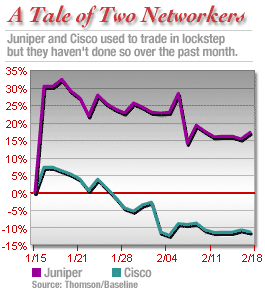
NEW YORK (CNN/Money) -
Cisco Systems and Juniper Networks are extremely similar companies. So it's not a surprise that the two stocks have tended to trade in a fairly similar fashion.
That is, until about the last month or so.
Since Juniper (JNPR: Research, Estimates) reported superb fourth quarter results in mid-January, its stock has tacked on about 17 percent while Cisco (CSCO: Research, Estimates) has fallen 11 percent.
Following Juniper's blowout quarter, Cisco reported results earlier this month that were also very strong. But they were apparently not strong enough to satisfy Wall Street, mainly because the numbers weren't as fantastic as Juniper's.

In addition, a recent study by Dell'Oro Group, a market research firm focusing on networking equipment, indicated that Juniper has gained some share in the router market at Cisco's expense.
Finally, Juniper announced a blockbuster deal last week, agreeing to purchase networking security firm NetScreen Technologies for $4 billion. Security is one of the key growth areas for Cisco.
Juniper is sexier but Cisco's no slouch
Now what does this mean for both stocks going forward? Juniper, by virtue of the NetScreen deal, will definitely be a tougher competitor. Before that purchase, it probably would have been safe to say that Juniper was like an RC Cola to Cisco's Coke. Now I think Juniper looks more like Pepsi.
And Juniper, partly because it is a much smaller company, has higher growth potential on its side. Juniper is expected to report that profits will more than double this year and increase at about a 20 percent clip over the next few years. Analysts are predicting 22 percent earnings growth for Cisco this fiscal year (which ends in July) and 15 percent over the next three-to-five years.
| Recently in Tech Biz
|

|
|
|
|
But the demise of Cisco may be greatly exaggerated. "Cisco is still the bigger of the two players. To say that Juniper is kicking Cisco's butt is really an overstatement," said Timm Bechter, an analyst with Legg Mason.
There are a bunch of factors in Cisco's favor that investors shouldn't overlook. Cisco has, by far, the better balance sheet. The company has no long-term debt and more than $24 billion in cash and investments while Juniper has just under a billion in cash and about $560 million in long-term debt.
Cisco also comes out ahead of Juniper in several other key financial metrics.
Gross margins in Cisco's most recent quarter were 68.5 percent while Juniper posted gross margins of 65.9 percent. That's not too shabby for Juniper. But the gap widens when you look at net margins. Cisco had net margins of about 24 percent compared to net margins of about 7 percent for Juniper.
Cisco's return on equity, a key measure of how a company is reinvesting its earnings, was 16 percent over the past twelve months. (Typically, a company with an ROE above 15 percent is said to be doing a good job of reinvesting its earnings) Juniper's ROE, however, was just 4.2 percent.
Juniper is riskier and more expensive
That leads me to the big discrepancy between the two companies: valuation. Juniper is trading at 77 times 2004 earnings estimates while Cisco trades at about 31 times calendar 2004 estimates.
Sure, Juniper probably deserves to trade at some premium for Cisco. But this might be a bit much considering that Cisco is still a larger and more profitable market leader. Juniper is trading at nearly 4 times its long-term growth rate while Cisco has a PEG (price-to-earnings growth ratio) of just slightly more than 2.
Ken Muth, an analyst with Robert W. Baird & Co., said there's no denying that both companies have strong fundamentals. But since Cisco has pulled back a bit lately, he's more optimistic about Cisco going forward. Muth said that Juniper's valuation has always been a bit of a "mystery."
And here's one more thing that Juniper fans might want to consider. Bechter thinks the NetScreen deal may be just the beginning of a shopping spree for Juniper. This is important to note because Wall Street has tended to punish highly acquisitive companies.
In order for the company to become even more Cisco-like, Bechter said that an acquisition of an Ethernet switching company such as Extreme Networks (EXTR: Research, Estimates), Foundry Networks (FDRY: Research, Estimates) or F5 Networks (FFIV: Research, Estimates) could make sense. Cisco generates the majority of its sales from routers and switches.
He added that Juniper also might want to expand into the home and small-business networking market. Cisco made a move into that area last year by purchasing Linksys and Juniper could counter by buying Linksys competitors Netgear (NTGR: Research, Estimates) or Taiwanese firm D-Link.
And that's the double-edged sword for Juniper. Making more acquisitions could very well help the company in its efforts against Cisco over the long haul. But it also makes the stock an even more risky bet in the short-run.
Bechter owns shares of Cisco and Juniper but Legg Mason has no investment banking ties to either company. Muth does not own shares of either company and his firm has no investment banking relationships with either of them.
Sign up to receive the Tech Investor column by e-mail.
Plus, see more tech commentary and get the latest tech news.

|

